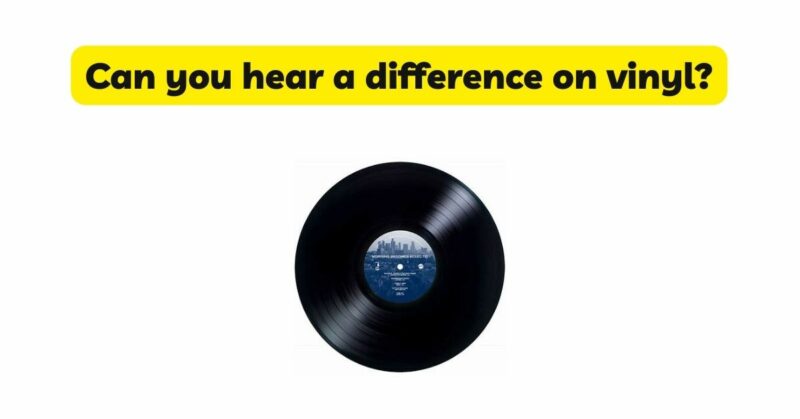Vinyl records have experienced a resurgence in popularity, captivating music enthusiasts with their unique sound and tactile appeal. One of the ongoing debates surrounding vinyl records is whether there is a discernible difference in sound compared to digital formats. In this article, we will explore the question of whether you can hear a difference on vinyl. By examining the technical aspects, the mastering process, and subjective experiences, we can gain insight into the distinctive qualities that make vinyl records a beloved medium for music lovers.
- Analog vs. Digital Sound: Vinyl records produce sound through an analog process, where physical grooves are decoded by a stylus, resulting in the creation of sound waves. On the other hand, digital formats use a series of numerical samples to recreate sound. The fundamental difference in sound generation between analog and digital formats lays the groundwork for potential audible distinctions.
- Warmth and Character of Vinyl: One of the qualities often associated with vinyl records is their warmth and character. Vinyl enthusiasts argue that the analog nature of vinyl produces a distinct and pleasing sound. The imperfections and variations in the playback process contribute to the unique sonic character of vinyl, offering a more organic and immersive listening experience.
- Dynamic Range and Sound Fidelity: Vinyl records are often lauded for their wider dynamic range compared to heavily compressed digital formats. Vinyl has the capacity to capture and reproduce subtle nuances and dynamics in music with greater fidelity. This means that the quietest passages and the most explosive crescendos can be faithfully preserved on vinyl, resulting in a more natural and authentic listening experience.
- Vinyl Mastering Process: The process of mastering music for vinyl is unique and requires specialized techniques. Engineers consider the physical limitations of vinyl, such as groove spacing and groove width, when preparing the audio for pressing. These considerations impact the overall sound quality and can contribute to the distinctive audio characteristics associated with vinyl records.
- Surface Noise and Pops: Vinyl records are not without their imperfections. Surface noise, including clicks, pops, and crackles, can be present due to dust, scratches, or the inherent nature of the vinyl medium itself. While some may perceive these imperfections as part of the vinyl charm, others might find them distracting. The presence of surface noise is a subjective aspect of the vinyl listening experience.
- Listener Subjectivity and Emotional Connection: Sound perception is a deeply subjective experience influenced by personal preferences, memories, and emotions. The tangible nature of vinyl records, the act of carefully handling and placing the needle on the record, and the ritual of listening can contribute to a heightened sense of engagement and emotional connection. These factors can shape the perceived differences in sound when compared to digital formats.
- Equipment and Setup: The playback equipment and setup used to listen to vinyl records play a crucial role in the overall sound quality and the ability to discern differences. High-quality turntables, cartridges, amplifiers, and speakers, along with proper calibration and maintenance, can significantly enhance the vinyl listening experience and reveal the nuances that differentiate it from digital formats.
- Personal Listening Preferences: Personal listening preferences also influence the perception of differences in sound on vinyl. Some individuals may have a heightened sensitivity to the nuances of vinyl and appreciate the distinctive qualities it offers, such as the warmth, depth, and presence. Others may not discern significant differences or may even prefer the convenience and consistency of digital formats.
Conclusion: The question of whether you can hear a difference on vinyl is subjective and dependent on various factors, including the listener’s preferences, equipment, and setup. Vinyl records offer a unique and immersive listening experience characterized by warmth, character, dynamic range, and a distinct mastering process. Surface noise, pops, and crackles are part of the vinylexperience, and while some may find them charming, others may perceive them as drawbacks.Ultimately, the enjoyment of music is a personal and subjective experience. The debate surrounding the differences in sound between vinyl and digital formats continues to spark discussions among music enthusiasts. To truly understand and appreciate the differences, it is important to embark on your own vinyl journey, experiment with different recordings, and explore different equipment setups.Whether you are drawn to the nostalgia, the tactile experience, or the unique sound qualities of vinyl, it is undeniable that vinyl records have a devoted following. Vinyl offers a connection to the past, a physical interaction with music, and a rich and immersive listening experience.So, if you are curious about the differences in sound on vinyl, embrace the opportunity to explore the world of vinyl records. Immerse yourself in the rituals, appreciate the imperfections, and let your ears and heart guide you in discovering the distinct qualities that make vinyl a cherished medium for music lovers.


